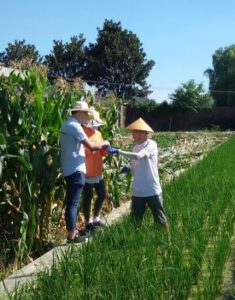
Discovery of a gene that helps rice plants grow in salty soil paves the way to developing salt-tolerant crops
Soil salinity poses a major threat to food security, greatly reducing the yield of agricultural crops. Rising global temperatures are expected to accelerate the buildup of salt in soil, placing an increasing burden on agricultural production. In a new study published in The Plant Cell, a team of researchers identified a gene that limits yield losses in rice plants exposed to salt stress and deciphered the underlying mechanism.
Around 20% of the world’s irrigated land is considered to contain elevated concentrations of salt, and the soil continues to get saltier as the climate warms. Agricultural production is hard hit by soil salinity; salt stress reduces the growth and yield of most plants, resulting in billions of dollars in crop yield losses annually. Rice—the staple food of more than half the world’s population—is particularly sensitive to salty soil, with even moderate levels of salt resulting in substantial yield losses. There is thus an urgent need to develop rice lines that can withstand salty conditions.
A team of scientists led by Jian-Zhong Lin and Xuan-Ming Liu of Hunan University in Changsha, China recently identified a gene that contributes to salt stress tolerance in rice. The gene, which they named STRK1 (salt tolerance receptor-like cytoplasmic kinase 1), was activated under salt stress conditions. The researchers generated two sets of transgenic plants, one in which STRK1 was expressed at high levels, and the other in which expression was greatly reduced. Under regular growth conditions, both sets of transgenic plants appeared normal. However, when challenged with salt, the transgenic plants with elevated STRK1 expression were greener and larger than Members of the research team collecting samples in a rice paddy field in Changsha, China. the non-transgenic control plants, and those with reduced levels of STRK1 expression were smaller and browner than the controls. Next, the team examined the effect of STRK1 on yield. “Notably, overexpression of STRK1 in rice not only improved growth but also markedly limited the grain yield loss under salt stress conditions,” said Jian-Zhong Lin.
The team then turned their attention to deciphering the mechanism by which STRK1 enhances the plant’s tolerance to salt. Salt stress triggers the production of potentially harmful reactive oxygen species, such as hydrogen peroxide, in plant cells. The group found that STRK1 (the protein encoded by STRK1) interacts with and activates a protein named CatC, which belongs to a family of proteins that decomposes hydrogen peroxide into water and oxygen. Thus, STRK1 increases the plant’s tolerance to salt stress by keeping the levels of hydrogen peroxide in check, and thereby minimizing the damage caused by accumulating reactive oxygen species. These exciting findings bring the research community closer to developing rice plants that thrive in salty soil. “Agricultural productivity is increasingly threatened by the salinization of irrigated farmland…Our work demonstrates that STRK1 is a promising candidate gene for protection of yield in crop plants exposed to salt stress,” stated Xuan-Ming Liu.
Author:
Kathleen L. Farquharson, PhD
kfarquharson@aspb.org
Science Editor, The Plant Cell
http://orcid.org/0000-0002-8032-0041
This research was supported by grants from the National Science Foundation of China (31170172, 31571635), Hunan Provincial Natural Science Foundation of China (2017JJ2042), Planned Science and Technology Project of Hunan Province (2017WK2012), and Planned Science and Technology Project of Changsha City (kq1701028).
Full citation: Yan-Biao Zhou, Cong Liu, Dong-Ying Tang, Lu Yan, Dan Wang, Yuan-Zhu Yang, Jin-Shan Gui, Xiao-Ying Zhao, Lai-Geng Li, Xiao-Dan Tang, Feng Yu, Jiang-Lin Li, Lan-Lan Liu, Yong-Hua Zhu, Jian-Zhong Lin and Xuan-Ming Liu. (2018). The receptor-like cytoplasmic kinase STRK1 phosphorylates and activates CatC, thereby regulating H2O2 homeostasis and improving salt tolerance in rice. Plant Cell DOI: https://doi.org/10.1105/tpc.17.01000.
To obtain an advance copy of the manuscript, please contact kfarquharson@aspb.org. About the researchers: To arrange an interview with a member of the team that conducted this study, please contact Dr. Jianzhong Lin of the College of Biology, Hunan University, Changsha, China at jianzhlin@163.com.
About The Plant Cell
Published monthly by ASPB, The Plant Cell (http://www.plantcell.org/) is the highest-ranking primary research journal in plant biology. The Plant Cell publishes novel research in plant biology, especially in the areas of cellular biology, molecular biology, genetics, development, and evolution. The primary criteria for publication are that the article provides new insight that is of broad interest to plant biologists, not only to specialists, and that the presentation of results is appropriate for a wide audience.
About ASPB
ASPB is a professional scientific society, headquartered in Rockville, Maryland, devoted to the advancement of the plant sciences worldwide. With a membership of almost 5000 plant scientists from throughout the United States and more than 50 other nations, the Society publishes two of the most widely cited plant science journals: The Plant Cell and Plant Physiology. For more information about ASPB, please visit http://www.aspb.org/. Also follow ASPB on Facebook at facebook.com/myASPB and on Twitter @ASPB.
Figure credit: Jian-Zhong Lin and Xuan-Ming Liu of Hunan University in Changsha, China. Restrictions: Use for non-commercial, educational purposes is granted without written permission. Please include a citation and acknowledge ASPB as a copyright holder. For all other uses, contact diane@aspb.org.
Keywords: agriculture, climate change, rice yield, plant science, transgenic
